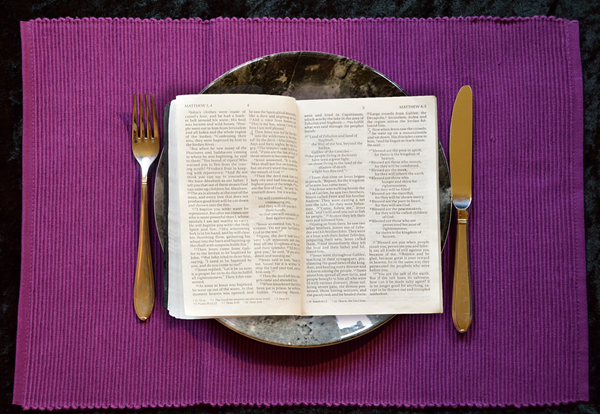“And whenever you fast, do not look dismal, like the hypocrites, for they disfigure their faces so as to show others that they are fasting. Truly I tell you, they have received their reward. But when you fast, put oil on your head and wash your face, so that your fasting may be seen not by others but by your Father who is in secret; and your Father who sees in secret will reward you.” (Matthew 6:16-18)
Entering the season of Lent is a good time to once again consider a means of grace John Wesley practiced all of his adult life. It is an ancient spiritual discipline found in Scripture that is part of Jewish and Christian practice. It is the first thing Jesus did following his baptism by John (Matthew 4:2; Luke 4:2).
Fasting is a powerful means of grace and the most neglected. It is powerful because fasting is a physical self-emptying that connects us with Christ (Philippians 2:7) and opens our hearts to his grace. Fasting is neglected for a at least one very good reason: people are naturally reluctant to voluntarily refrain from eating. No one wants to go hungry. Especially when we are bombarded by messages at all times of the day to eat and drink. This is, I think, all the more reason for followers of Jesus Christ to practice fasting; at least during the season of Lent.
By fasting I mean anything from skipping a meal at least once a week to refraining from eating for 24 hours. John Wesley practiced a weekly fast from sundown on Thursday to sundown on Friday. He refrained from eating food while taking water and tea during the day. On Friday evening he broke the fast with a light meal (broth, bread, and water or tea). During the fast Wesley spent much of the time in prayer and reading Scripture.
I can think of at least four reasons to practice a weekly fast during Lent:
- Jesus did it and taught his disciples to do the same. Disciples are people who learn their teacher by emulating him or her. If you are a follower of Jesus then fasting is a practice you should try. Of course you must be discerning when taking on a practice that impacts your body and health. If you have a physical condition that is not conducive to fasting then Wesley recommends another form of fasting known as abstinence. Refrain from eating a favorite food for a time. When you miss the food or drink or habit, take time to pray. The fact that Jesus practiced fasting and taught his disciples to join him tells me that disciples today should also join him.
- Fasting reminds us of our dependence upon God and his grace. When you skip a meal, or two or three, and feel the discomfort of an empty belly you are reminded that your life depends upon food and drink. You cannot live without the produce of the earth and the labor of others to bring the food you need to your table. Christians believe everything we need to live is supplied by God who is the “maker of heaven and earth.” When you fast you are reminded of your dependence upon God and his grace.
- Fasting brings you into solidarity with the poor. Jesus said, “I was hungry and you gave me food, I was thirsty and you gave me something to drink, I was a stranger and you welcomed me” (Matthew 25:35). He identified himself with the people of the world who are hungry and thirsty; the ones who are compelled to fast because they have no food. When you fast you share, for a time, in their suffering. When you share in the suffering of the poor, you share in the continuing suffering of Christ who calls you to join him in his mission setting the world right.
- Fasting is time for prayer. Fasting and prayer go together. When you feel the ache in your belly telling you of your need for God and his grace, you are reminded to stop and pray. Fasting is a time of self-emptying to make room for God. It tells you that God wants your heart, soul, mind, and Prayer is more than an exercise of the mind. It involves the whole self because God wants your whole self to participate in his mission in the world. Fasting awakens you to the needs of the world and reminds you that God loves you because you are part of the world he has made. We fast because the world is broken. Fasting and prayer helps us to hear and see what God hears and sees every day.
Lent is a good time to add a weekly fast to your regular acts of devotion. Perhaps your group could add a clause for the weeks of Lent to practice a weekly Wesleyan fast. From Thursday dusk to Friday dusk refrain from eating solid food. Take only water, coffee, or tea. When you feel hungry during the day, stop to pray for the world, the church, yourself, and your fellow group members. If your health prevents you from such a fast, then abstain from a favorite food or habit. When you miss the food or habit take time to pray. You could also set aside money for the cost of all the meals you miss and put into a jar. During Holy Week give the money from your skipped meals to Bread for the World, or other hunger ministry.
Rev. Steven W. Manskar, D. Min., is a clergy member of the Minnesota Conference of The United Methodist Church. He served congregations in Maryland, Minnesota and is the former Director of Wesleyan Leadership at Discipleship Ministries. He is the author of several books. His most recent is Disciples Making Disciples.
Originally published at https://blog.umcdiscipleship.org/fasting-the-most-neglected-means-of-grace/, Feb. 18, 2015.

